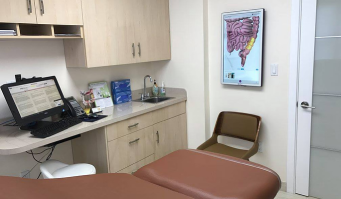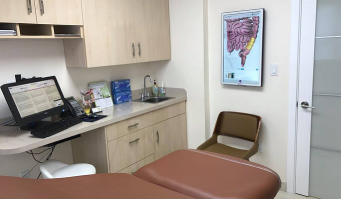Polyps
- Over 1000 5 Star Reviews
- Personalized Care
- Award Winning GI Specialist
WHAT ARE POLYPS?
A colon polyp is a small clump of cells that forms on the lining of the colon. Most colon polyps are harmless. But over time, some colon polyps can develop into colon cancer. Colon cancer can be fatal when found in its later stages.
Anyone can develop colon polyps. You’re at higher risk if you are 50 or older, are overweight or are a smoker. You’re also at higher risk if you have a personal or family history of colon polyps or colon cancer.
Colon polyps don’t usually cause symptoms. It’s important to have regular screening tests because colon polyps found in the early stages can usually be removed safely and completely. The best prevention for colon cancer is regular screening for and removal of polyps.
Causes of Polyps?
Normal cell growth and division follow a precise order. However, mutations in specific genes can disrupt this process, leading to uncontrolled cell division even when new cells aren’t required. This uncontrolled proliferation within the colon and rectum results in the formation of polyps, which can occur anywhere in the large intestine.
Two primary categories of polyps exist: nonneoplastic and neoplastic. Nonneoplastic polyps generally pose minimal risk of developing into cancer. In contrast, neoplastic polyps encompass adenomas and serrated types. Among these, adenomas carry the highest potential for evolving into cancer over time. Serrated polyps may also become cancerous, depending on their size and location. Notably,
Symptoms of Polyps?
- Change in bowel habits
- Change in stool color
- Iron deficiency anemia
- Pain
- Rectal bleeding.
Symptoms of Polyps?
People with colon polyps often experience no symptoms and remain unaware of their presence until a doctor’s examination. Occasionally, however, symptoms occur, and our gastrology doctors should adequately address them for an accurate diagnosis and treatment plan.
Diagnosis of Polyps
- Colonoscopy
- Virtual colonoscopy
- Flexible sigmoidoscopy
- Stool-based tests.
Treatment of Polyps
- Polypectomy
- Minimally invasive surgery
- Total proctocolectomy

“Thank you for visiting Forest Hills Gastroenterology & Liver Disease, my goal is to treat my patients in a highly personalized manner and I am dedicated to give you the utmost attention and respect that you deserve. For more infromation on this disease or to schedule a consultation with me, please give us a call or book a tele-health appointment online.”
Albert Shalomov
Dr. Albert Shalomov, MD
Disclaimer: Educational Infromation, Not Medical Advice
It’s important to remember that the information provided here is intended for educational purposes only and should not be misconstrued as definitive medical advice. Always seek the guidance of a qualified gastroenterologist for accurate diagnosis and treatment of any specific gastrointestinal condition. Only trained healthcare professionals can provide personalized recommendations and ensure your well-being.




